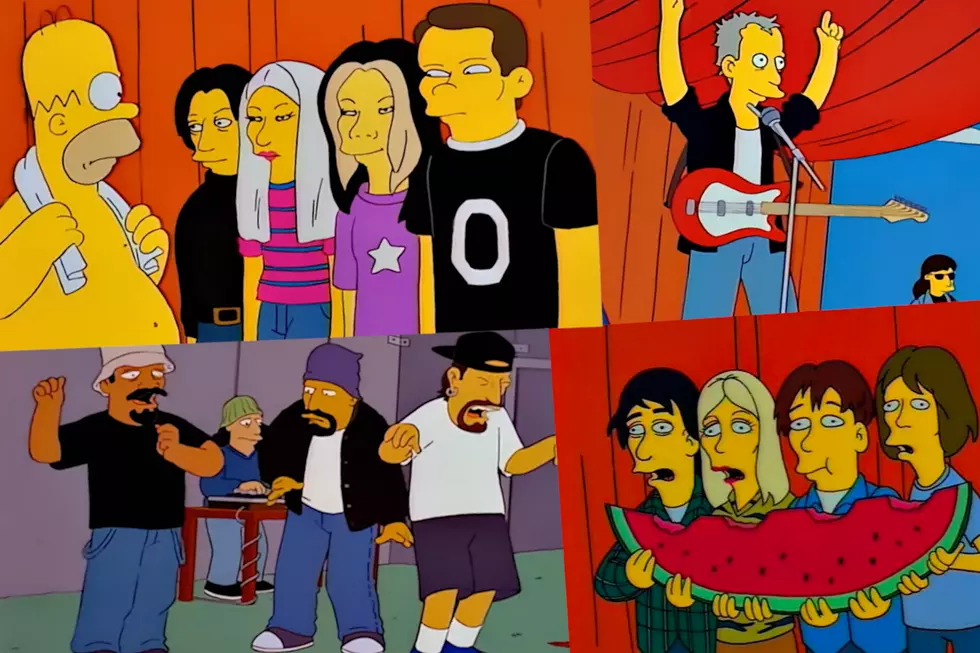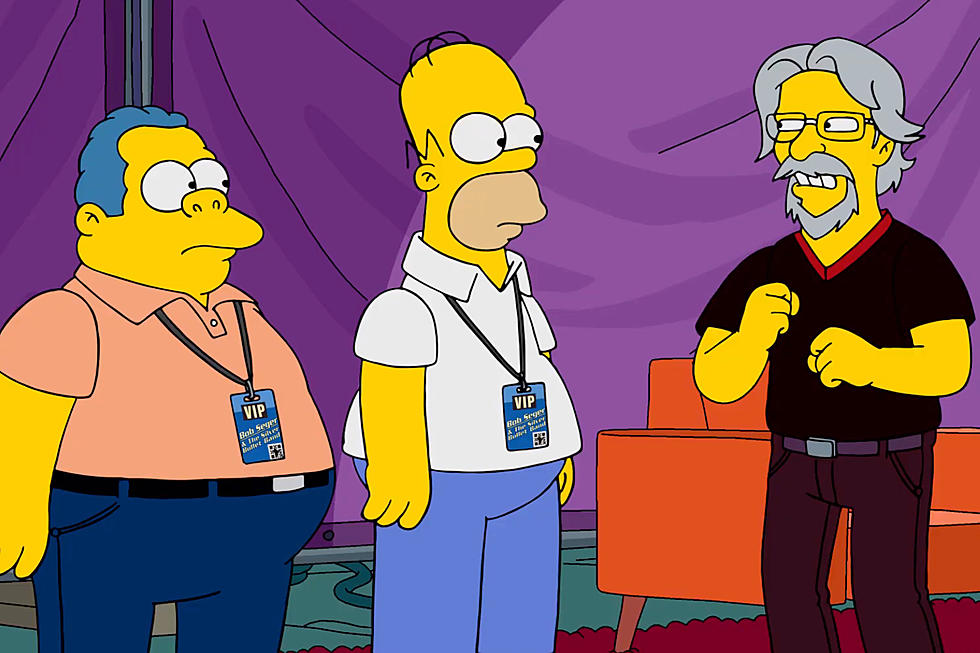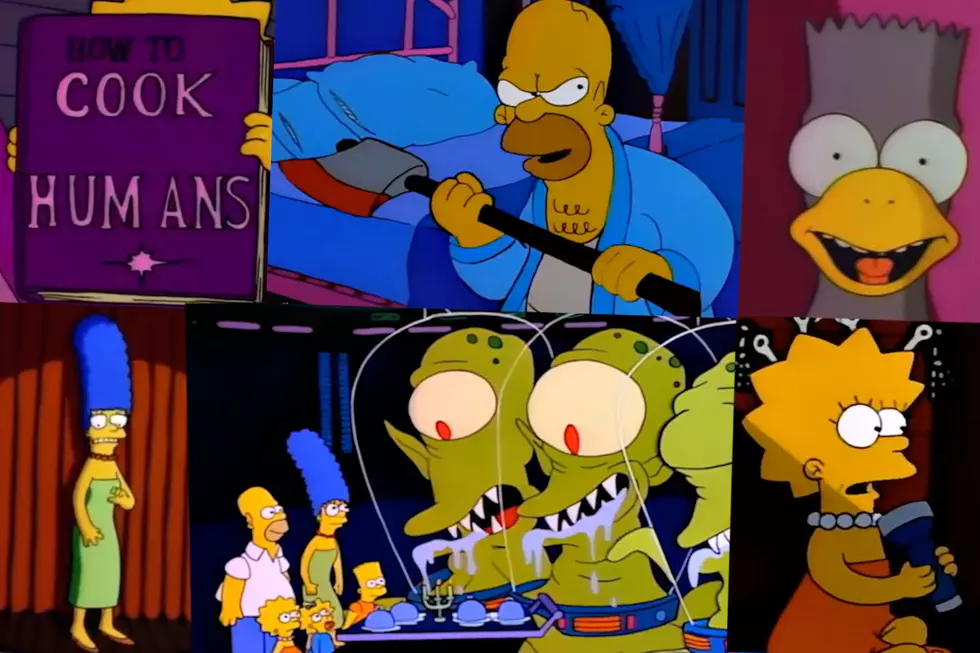
25 Years Ago: ‘The Simpsons’ Rocks Out With ‘Homerpalooza’
Before there was Coachella or Bonnaroo, there was "Homerpalooza" - an eclectic lineup of artists assembled for a memorable episode of The Simpsons that aired on May 19, 1996.
The story was the brainchild of writer Brent Forrester, who based the script on his own experience attending Lollapalooza and feeling like an elder outcast at the music fest.
"I was probably 27 at the time, which qualified you as being way too old to be at Lollapalooza," Forrester remembered in the episode's DVD commentary. "I was just hassled from beginning to end."
Several of the writer’s personal experiences made it directly into the episode, including an instance when Forrester was called a “narc.” "All of Homer's alienation was my experience of feeling like a loser there," the writer admitted.
Watch Homer Get Called a Narc in 'Homerpalooza'
Forrester would weave his plot around Homer Simpson’s reluctant realization that he was no longer young and cool. Looking at his children’s musical interests and finding little in common with his own, as well as visiting a local record store and discovering he didn’t know any of the artists whose posters adorned the walls, served as sobering moments for Homer, a man who is rarely sober.
In an attempt to prove his coolness, the Simpson patriarch buys tickets to Hullabalooza, a traveling festival fabricated in the vein of Lollapalooza. While there, Homer accidentally discovers he can withstand the impact of a cannonball fired into his gut, a skill that lands him a spot on the tour’s "Pageant of the Transmundane" (aka freak show). While this distinct talent gives him a brief taste of fame, Homer soon must decide if hanging onto his coolness is worth dying for.
Watch Homer Visit a Record Store in 'Homerpalooza'
"We wanted this to be a music episode about what's cool when you get older and how that changes," the episode's co-showrunner Josh Weinstein explained to Vice.
To really capture the varied musical tastes of the era, show producers sought to assemble a festival lineup featuring acts from varied genres, including alternative, classic rock and hip-hop.
"We wanted to have somebody who represents every type of music," Weinstein noted. “So that's sort of how we started to cast the net."
Bob Dylan, Neil Young and Bruce Springsteen were among the classic rockers discussed before producers arrived at Peter Frampton.
“The casting director, Bonnie Pietila, called me up and said, ‘Would you be interested in doing the voice for yourself in The Simpsons?’ Frampton recalled in a conversation with Consequence of Sound. “And I said to her, ‘Are you sure you have the right number?’ I’m thinking, ‘Well, you know I’m not really on top of the charts at the moment, so this is very interesting.’”
Watch Peter Frampton on the 'Homerpalooza' Episode of 'The Simpsons'
As Frampton noted, his career wasn’t soaring when The Simpsons called. His most recent album at the time, 1994’s self-titled LP, didn’t even crack the Billboard 200. Ever self-aware, the guitarist admitted to Pietila that he wouldn’t be headlining a Gen-X style festival like Hullabalooza in real life.
“It was in that moment that I realized they wanted to have the old, crusty, old-time rock star who has seen everything and been everywhere and is a little grumpy,” Frampton revealed. “She said she couldn’t have said it better herself. So, I told her I loved it! I love self-deprecation, and it’s something that I think draws you to your fans, too, when they see you’re fallible.”
From the alt-rock world, producers recruited Sonic Youth, a favorite of show creator Matt Groening, and the Smashing Pumpkins, then flying high off the success of their Mellon Collie and the Infinite Sadness LP.
Watch the Smashing Pumpkins on the 'Homerpalooza' Episode of 'The Simpsons'
Rounding out the lineup would be Cypress Hill, the genre-bending hip-hop group from Los Angeles. "In the past, I was very skeptical about doing certain things, especially us in cartoon form," revealed Cypress Hill member Sen Dog. "But when I got that call, I'd been a fan of The Simpsons and I'd been watching it since it first came out, so I was like, 'Yes! Heck yeah, let's do it.'"
Seeing Frampton’s name already connected to the episode also helped cement Cypress Hill’s involvement. “That was one of the big names that I thought, “Whoa, he’s going to be on the show, too? This is going to be great,” Sen Dog admitted. “Peter Frampton! That’s royalty there.”
Each of the groups laid down audio separately, recording voice parts amid their respective touring and recording schedules. The Simpsons made sure to give every band member at least one line. “We invite the whole band, we don't invite one person," Pietila later explained. "So if the whole band is there, they should all participate as equally as possible."
While all of the artists received praise for their work - Weinstein once raved to Entertainment Weekly about Billy Corgan’s Homer and Marge impersonations - producers were especially impressed with Frampton’s acting chops. "He's sort of like the ideal guest star: He's willing to make fun of himself, he's got a great sense of humor and he had a great voice,” Weinstein explained. “He was just really fun, and we ended up wanting to do more with him.”
Frampton was flattered to find out his work was so well received, especially considering he was a fan of the show well before being asked to guest star. “That meant a lot to me coming from those brilliant guys,” he admitted. “They are just so good at what they do. It’s inspiring.”
See Cypress Hill in the 'Homerpalooza' Episode of 'The Simpsons'
"Homerpalooza" quickly became a Simpsons classic. From Frampton’s inflatable pig to Sonic Youth raiding the side-stage cooler, the episode offered many memorable moments. The scene when the Smashing Pumpkins and Homer first met - "Billy Corgan, Smashing Pumpkins." "Homer Simpson, smiling politely" - became instantly quotable.
Still, Cypress Hill may have scored arguably the episode’s two biggest moments: hiring the London Symphony Orchestra “possibly while high” in one scene, before Sen Dog later claims that festivals are about “getting toasted. Niiiicely toasted."
"Every now and then, people will want an autograph, and they'll say, 'Hey man, can you write: 'Getting toasted, nicely toasted?'" the rapper admitted decades later. "That line really got to people for some reason."
Watch the Conclusion of 'Homerpalooza'
"Homerpalooza" also offered a deeper message, reflecting humans’ natural desire to cling to their youth, even as they transition into family life and adulthood.
“It rings true as you get older,” Weinstein opined. “It rings true for different reasons. And the thing that makes The Simpsons great is when it rings true and it speaks to your life. I think in that way it's a classic."
36 Rock Star Moments From 'Family Guy'
More From 105.7 The Hawk










